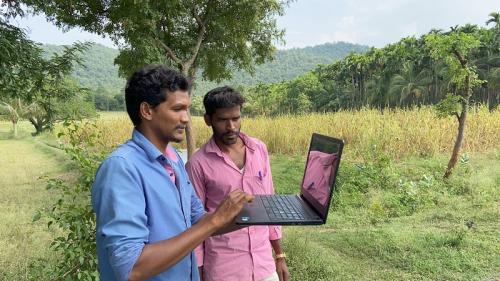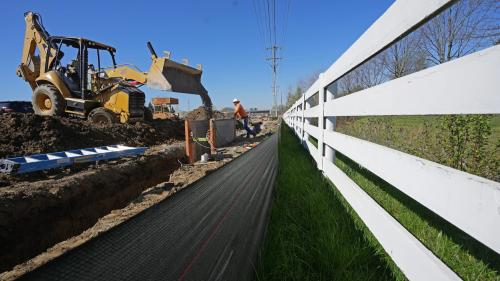This month, the Federal Communications Commission (FCC) celebrated a milestone in the Affordable Connectivity Program (ACP), which provides a monthly discount on broadband service to eligible Americans, as well as a one-time subsidy toward an internet-enabled device. By mid-August 2023, 20 million eligible families had enrolled and benefitted from the program across all 50 states—a stellar accomplishment for the FCC-administered affordability program. Created by the Biden-Harris infrastructure deal, the $14.2 billion allocated to the ACP program is projected to run out by mid-2024. The ACP has been targeted by some Republicans as a potential source of waste, fraud, and abuse, which raises concerns it could be prematurely eliminated or pared down by critics who question its usefulness. On August 17, 2023, however, a bipartisan group of 45 members of Congress wrote a letter calling for the extension of the ACP beyond 2024 and urging their congressional colleagues to extend its funding in the next appropriation bill—which comes at a time when the congressional budget deadline is looming.
Members of Congress and other interested parties have floated several other ideas for ACP funding, including providing additional funds to the existing Universal Service Fund or leveraging other government dollars. In a 2022 report, Paul Garnett, the founder of the Vernonburg Group, suggested that the ACP required between $30 billion and $35 billion to fund monthly broadband services, excluding devices, over the next five years. Only 12 million households had signed up in 2022, compared to a significant jump of 8 million more this year. With the options running thin, there may be another potential source of funding for the ACP for Congress to consider—only this time, it’s intricately connected to the U.S. spectrum auctions that were formerly under FCC jurisdiction. With $230 billion dollars of revenue generated by the process of selling government-owned spectrum assets since it began in 1994, approximately 1/6th of average annual proceeds could keep the ACP afloat, helping new subscribers get online and keeping existing ones connected as the need for affordable broadband grows. But this can only happen if Congress reauthorizes the FCC, the federal agency in charge of spectrum auctions, to restart the process after allowing the agency’s auction authority to lapse earlier this year.
The lapse in FCC spectrum auction authority
In the context of telecommunications, spectrum refers to a specific band of the electromagnetic spectrum, which encompasses the range of all types of electromagnetic radiation from gamma rays to visible light to, in this case, radio waves. Spectrum is used to transmit wireless signals, carrying information between devices such as radios, televisions, and mobile phones. Spectrum is categorized into bands based on wavelength—different wavelengths have different advantages and disadvantages and are used by different communications technologies—and access to these bands is subject to strict government regulation to ensure that telecom transmissions do not disrupt each other.
For decades, the auction of federal spectrum has been critical to the expansion of the nation’s wireless communications, particularly for the private sector. The FCC regulates access to spectrum by conducting auctions for licenses to use specific spectrum bands to organizations and individuals. As previously noted, FCC spectrum auctions have generated more than $233 billion in revenue for the U.S. Treasury since its inception. Since ensuring access to spectrum is crucial for existing telecommunications technologies to work effectively, as well as to enable the advancement of wireless technology, the National Telecommunications and Information Administration (NTIA) is collaborating with the FCC to develop a National Spectrum Strategy (NSS), a “government-wide approach to maximizing the potential of our nation’s spectrum resources.” In March 2023, the NTIA released a Request for Comment on the NSS, which is expected to include both long-term spectrum planning and the reactivation of a “spectrum pipeline,” which refers to the process for identifying, allocating, and repurposing spectrum bands.
There are currently no bands in the spectrum pipeline. Not only that, Congress has allowed the FCC’s authority to structure and conduct spectrum auctions to lapse. In an April 2023 letter to Congress, the FCC Commissioners urged lawmakers to reinstate the Commission’s auction authority to allow for economic growth and “safeguard our national security.” The Commissioners also noted that the upcoming World Radiocommunication Conference (WRC) in November 2023 increased the urgency to reinstate the FCC’s auction authority. The WRC, which convenes delegates from more than 190 International Telecommunication Union (ITU) member states and hundreds of companies, facilitates discussion to preserve international spectrum standards, reduce interference, and enable interoperability. The upcoming WRC will consider several important issues, such as the frequencies available for 5G and 6G international mobile telecommunications networks and fixed-satellite networks used for piloting unmanned aircraft. Without authority to auction spectrum, the U.S. is sending a signal ahead of the conference which may have detrimental consequences for businesses and the government down the line.
Although the Department of the Treasury has been the recipient of most funds raised by FCC spectrum auctions, in recent years, lawmakers have earmarked auction proceeds to fund various federal programs directly. For example, the proceeds from highly competitive auctions have resulted in new and continuing funding for various projects, including paying down the deficit, the FirstNet public safety communications network, the Next Generation 911 Grant program, and the Department of Defense. Outside of the national debt, these other projects have not been subjected to the appropriations process. Although some have derided this practice as bypassing the traditional appropriations process, it also provides an opportunity to generate much-needed revenue to close the digital divide.
Leaving the ACP aside, on March 10, 2023, Congress failed to extend the Commission’s auction authority, which disallowed the agency from conducting spectrum auctions for the first time in 30 years. This also means that the FCC is unable to issue licenses for hundreds of millions of dollars’ worth of spectrum sold to commercial providers last year, which, in turn, provides additional revenue to the national treasury. During a June 2023 congressional hearing, Representative Cathy McMorris Rodgers assured FCC Chair, Jessica Rosenworcel, that she and her colleagues were working to renew the agency’s authority over U.S. spectrum auctions. In May, the Spectrum Auction Reauthorization Act of 2023 cleared the House Committee on Energy and Commerce. But with Congress in summer recess, the status of this issue remains unresolved, to the detriment of U.S. policy interests.
Make the ACP a beneficiary of auction proceeds
Restoring the FCC’s authority to conduct spectrum auctions could raise millions—if not billions—of dollars that could help close the digital divide and bridge the gap between those with internet access and those without. The ACP is a prime example, and not one that should be brushed off over partisan concerns, as well as statutory restrictions in the spectrum Act. Established by the Infrastructure Investment and Jobs Act (IIJA), the ACP provides a discount of up to $30 per month for internet service for eligible households and up to 75 per month for households on Tribal lands—households can also receive a one-time discount of up to $100 toward purchasing a laptop, desktop, or tablet computer.
As noted, more than 20 million households have enrolled. Subsidies like the ACP are essential, not only for expanding access to internet but also for bolstering the economy. According to a 2021 study, subsidized broadband programs increase employment rates and earnings of their grantees. The ACP is expected to exhaust its funds in 2024, leaving its 15 million recipients without critical support. The revenue generated by FCC auctions could be used to rescue the ACP from lapsing, preventing more than 1,800 broadband providers from losing subscribership as they build and deploy new broadband services. In the end, the mantra of ‘build it, and they will come’ could not be more relevant in the discussions to preserve the ACP—at least until small and medium-sized broadband service providers (particularly those serving small rural areas where households benefit from the ACP) can acquire some market stability.
The ACP is not the only effort to close the digital divide that could benefit from funds from FCC spectrum auctions. The IIJA dedicated $42.5 billion to fund broadband expansion to states through the Broadband Equity, Access, and Deployment (BEAD) Program over an implementation period of five years, and $2.7 billion for digital equity initiatives. Ensuring that broadband expansion can continue past the five-year mark will require additional funding, and that should be independent from whoever wins the 2024 presidential election. Furthermore, the BEAD Program is focused on “last mile” services, while the IIJA allocated only $1 billion to “middle mile” broadband deployment, which some industry leaders already worry is insufficient. In fact, the current draft of the Spectrum Auction Reauthorization Act would specifically allocate some proceeds from future spectrum auctions to build out middle mile infrastructure under Section 60401 of the IIJA. Since the Act specifies where all future proceeds would be deposited (with the lion’s share reserved for deficit reduction), Congress would need to pass an amendment to the Act to allow the ACP to benefit from auction proceeds.
These proceeds could also be used to fill in some of the broadband deployment gaps, especially in areas that become more difficult to serve, and could also expand digital equity programs, such as infusing more support to community anchor institutions, such as schools, libraries, or hospitals that provide vital community services. These institutions are indispensable sources of internet access and can play a critical role in closing the digital divide as evidenced through their expanded help during the COVID-19 pandemic. Moreover, in February 2023, the FCC-appointed Equity and Diversity Council approved a working group to explore expanding the definition of an anchor institution to include non-traditional community institutions, such as LGBTQ-run and populated centers and senior organizations. Reinstating the FCC’s auction authority could generate revenue to support such local projects will ensure that the federal investments have a longer shelf life beyond the initial funding of the IIJA, and buffer any potential losses experienced when the supply outpaces demand, or vice versa.
Making the ACP a permanent program
As the future of the ACP hangs in the balance, perhaps it’s time for Congress to return FCC authority over spectrum auctions to manage the expectations of international partners and be more creative in how the revenues are allocated with some allocation to broadband expansion and affordability efforts like the ACP.
States have been rapidly receiving funds from the BEAD program to support their custom broadband expansion strategies, but how the states’ expansion efforts will be maintained after the five-year implementation period ends remains an open question. Further, how the broadband deployments will be sustained via a strong and sustainable customer base are of critical importance. Meanwhile, with the ACP is set to expire next year, millions of Americans without crucial support for getting online will also struggle to stay connected. While the FCC’s lapsed auction authority and an empty spectrum pipeline disadvantage technological innovation and jeopardize U.S. credibility in global markets, reinstating the FCC’s auction authority could also be a gamechanger for funding current investments in closing the digital divide.








Commentary
Reinstating the FCC’s auction authority could save the Affordable Connectivity Program
August 31, 2023